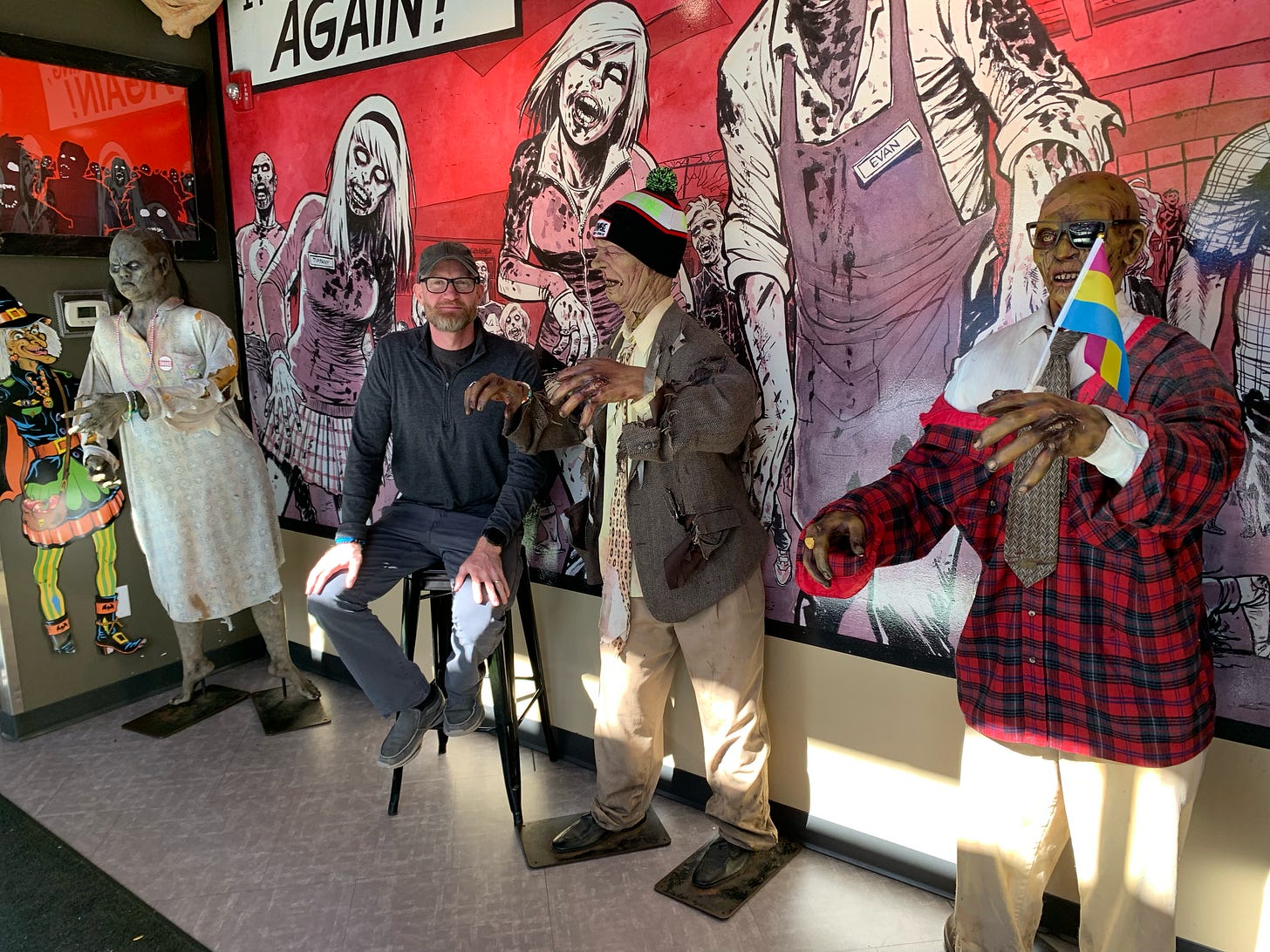The Existential Nature of the Supernatural

Happy Halloween! This is one of my favorite times of the year, and it has been an especially awesome Halloween-themed month for me. Last week, I gave the keynote talk at the Zombie Apocalypse Medicine Meeting, a conference about the science, medicine, art, and culture of managing apocalyptic risks. It was a really fun and educational event. The week before, when I was in Des Moines to give the keynote address at the Greater Des Moines Habitat for Humanity Key Awards event, I stopped at Zombie Burger, a zombie-themed restaurant (photo below), and had a great veggie burger called the Negan.
And then there is the yearly tradition my wife and I have that we call Shocktober, in which we watch scary movies throughout the month of October. It is a great time and something we really look forward to, though I must admit I am more enthusiastic about Shocktober than my wife. We watch these films for fun, but the themes they explore (ghosts, magical powers, otherworldly beings, life after death) reflect something deeper about human nature. Our fascination with the supernatural extends far beyond entertainment.
In previous newsletters, I have written about how we benefit from engaging with scary and apocalyptic content. In my piece on the surprising benefits of scary fun, I explored research by Coltan Scrivner, author of the recently released book, Morbidly Curious: A Scientist Explains Why We Can’t Look Away, revealing that horror media consumption is associated with psychological resilience. And in my newsletter on apocalyptic thinking, I discussed the work of Athena Aktipis, author of A Field Guide to the Apocalypse: A Mostly Serious Guide to Surviving Our Wild Times, highlighting how dark narratives serve constructive purposes by encouraging us to think about potential threats and inspiring us to find solutions. This kind of recreational fear allows us to explore danger in a safe context while activating our cooperative and imaginative capacities.
Of course, many people don’t just enjoy supernatural content as fiction. They believe in it, or are at least open to the possibility of the supernatural being real.
According to a 2023 Gallup poll, 74 percent of Americans believe in God, 69 percent believe in angels, 67 percent believe in heaven, 59 percent believe in hell, and 58 percent believe in the devil. A 2023 AP-NORC survey found that 72 percent believe in the power of prayer and 83 percent believe there are things that science or nature cannot explain.
At the same time, Americans hold a wide range of non-traditional supernatural beliefs. A 2025 Gallup poll found that 48 percent believe in psychic or spiritual healing and another 19 percent are not sure, leaving only 32 percent who don’t believe. Roughly four in ten believe in ghosts with another 20 percent unsure, meaning only about 40 percent reject the idea entirely. For other paranormal phenomena, between 24 and 29 percent believe in telepathy, communication with the dead, clairvoyance, astrology, reincarnation, and witches, with roughly 20 percent unsure about each and about half outright rejecting these beliefs.
A 2025 YouGov survey found that 60 percent of Americans report having encountered some form of paranormal experience. And Barna research found that 82 percent of U.S. adults say they believe in or are open to the possibility of a spiritual or supernatural dimension.
What unites all of these beliefs, from traditional religious convictions to curiosity about the paranormal, is that they are motivated, at least in part, by our shared existential nature. As I explored in my 2018 book Supernatural, humans are a cognitively advanced species capable of pondering deep questions about the nature of our existence, our place in the universe, and what might lie beyond the material world. We are in search of transcendent meaning and supernatural ideas and beliefs help us in this existential quest. Indeed, research my colleagues and I have conducted finds that beliefs about phenomena beyond our current scientific understanding, whether traditional religious concepts or nontraditional paranormal beliefs, are uniquely predicted by our need for meaning.
Importantly, supernatural beliefs are inherently social. Prayer is communion with the divine. Beliefs in ghosts, angels, and aliens all involve social beings and social relationships. We imagine these entities watching over us, communicating with us, or interacting with us in meaningful ways. We naturally build communities around these beliefs, from traditional churches and religious congregations to online forums dedicated to paranormal phenomena and spiritual exploration.
When people turn away from traditional religious institutions, they often don’t abandon this spiritual side altogether. Instead, they find new outlets for their existential curiosity. As I discussed in Supernatural, and this article I wrote from the New York Times, it is often people who are not traditionally religious who are more open to paranormal and non-traditional supernatural beliefs. Our capacity to wonder about the unseen, to imagine realities beyond the material, and to seek meaning in mystery is part of what makes us human.
People often think that rational, evidence-based thinking and supernatural beliefs are in conflict. But that is not how humans work. We are capable of both. To be sure, there are extremes. For example, some people reject modern medicine, relying only on religious or spiritual-based healing. But most don’t. They utilize both. They turn to science-driven medical intervention and prayer. This reflects something important about our nature. No matter how rational and empirically minded we become, there remains another side to us that is open to mystery, curious about possibilities beyond what science can currently reveal, and willing to take a leap of faith.
The supernatural themes that captivate us in fiction reflect deeper truths about who we are as a species uniquely capable of contemplating forces beyond the material world and exploring existential questions about meaning in that contemplation.
Have a great (and spooky) weekend!
Clay

